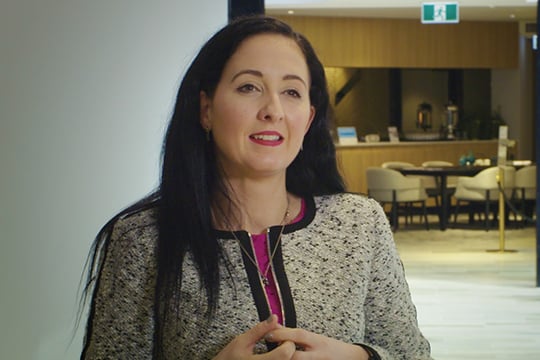Consumers demanding end-to-end transparency

Australia’s red meat industry needs to continue to amplify consumer trust in products via end-to-end transparency in the supply chain to satisfy customers who increasingly want to know where their food comes from.
That was among the messages stakeholders heard at the inaugural Integrity System Company (ISC) Stakeholder Forum in August, when Retail Doctor’s General Manager – Consumer Insights, Anastasia Lloyd-Wallis (pictured above) addressed the forum.
Anastasia took a deep dive into consumer insights, outlining the value of integrity systems to consumers in verifying provenance and ensuring transparency in a retail ecosystem where it’s no longer about online and offline, but rather a whole journey.
Anastasia said amid the rise and rise of digital, the big five retail consumer trends of omnicommerce, education, time as a currency, trust and ethics were growing in a changing consumer landscape.
“Trust is an increasing concern for consumers. End-to-end product transparency really builds this relationship. We’re in a good position because our customers can trust us, but how do we demonstrate it so they can hear what we can offer?” Anastasia said.
“Customers are looking for transparency and trust much more than they were. Customer trust has reduced, and we need to amplify that trust via end-to-end transparency.”
Looking ahead, data systems to show the breeding, the fattening, the birth date, the processing date and the logistics throughout the supply chain should be used to demonstrate this complete transparency and generate trust amongst customers.
“And ethics – overall, 77% of Australian consumers say it’s important to see this. Consumers are really interested in the journey and transparency and want to know ‘where has this product come from?, particularly for Millennials,” Anastasia said.
Anastasia said Millennials – the generation born after 1980 and before 2000 – view trust and ethics as important drivers when they’re buying products.
“40% of Millennials would walk past a supplier or choose a different product if it didn’t align with what they were looking for,” Anastasia said.
“This is our future customer. Millennials, one of the largest generations in history, is about to move into its prime spending years.
“It’s estimated Millennials will comprise 50% of the global workforce by 2020, and Millennial spending power is set to overtake Generation X by 2020. It’s important for us to understand the way they behave and their emotional drivers.
“20% of Millennials do all of their grocery shopping online, 60% spend more than five hours a day on their phone, and 60% actively engage with brands and products on social media and online.
“They’re really looking for a seamless, friction-less experience when they’re shopping.
“It’s very much about time as currency for this customer and transparency, which I think we do very well in this sector, showing full provenance of our products, end-to-end.
“However, we need to remember Millennials can be anything from a 19-year-old student to a 30-year-old corporate. It’s important to understand emotional drivers and personality types and how to appeal to that.”
Anastasia said omnicommerce, referring to a consistent, integrated and seamless customer experience across all sales channels, whether in-store, online, on a mobile device or on social media, shows we are shoppers 24/7, customers can buy anything with the click of a button.
“68% of consumers would like to click and collect, and we’ve seen a 130% growth in food apps,” Anastasia said.
“And education means with 24/7 shopping, we now have 24/7 information. Customers have all the information at their fingertips so we need to be making sure we are giving them this information rather than them searching and finding it elsewhere.”
For Anastasia, her disciplined, rational and precise personality type sees her purchase the same red meat products every week, based on research and quality functionality. Coming to her own judgement, Anastasia bases her purchases on the information available to her and she considers brand trust as important.
She said as consumers are the most important part of the supply chain, it’s critical for the red meat industry to understand consumers’ needs and adapt integrity system communication to reinforce a consistent source of ethics and trust through traceability and end-to-end transparency.